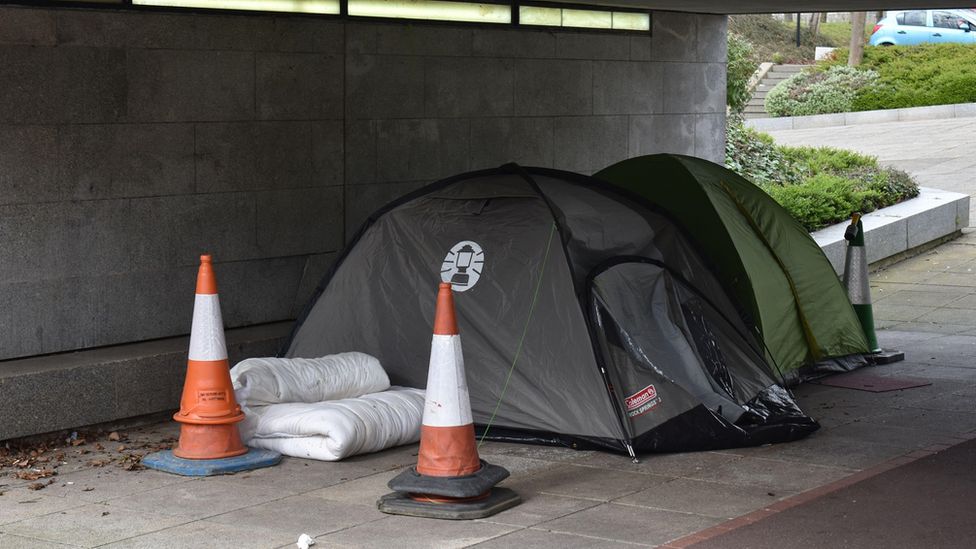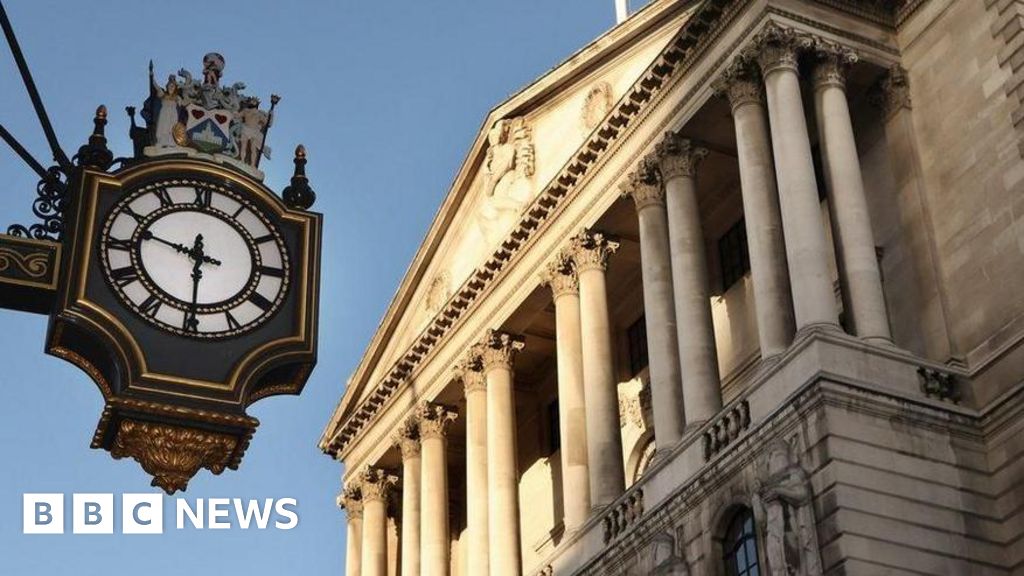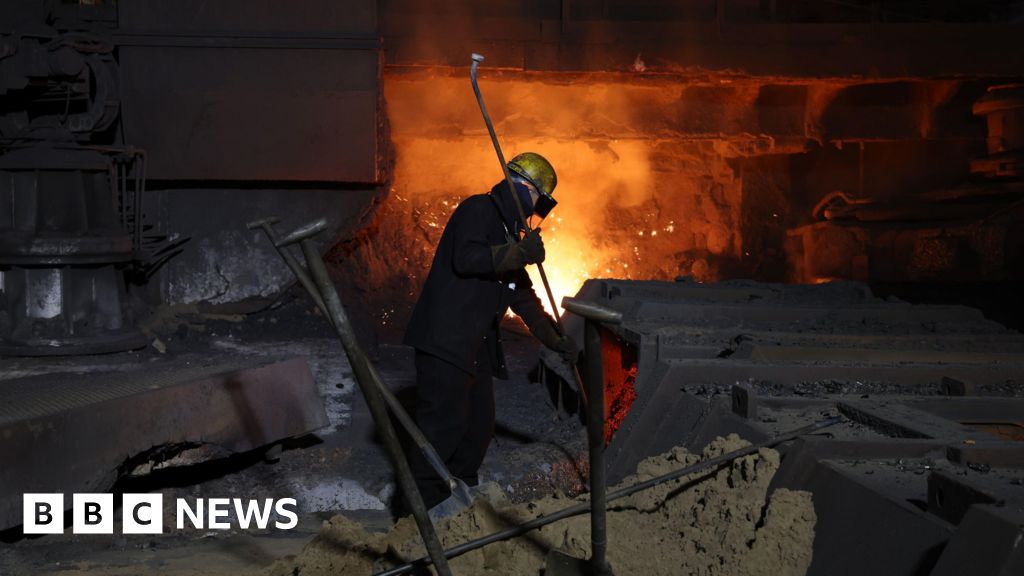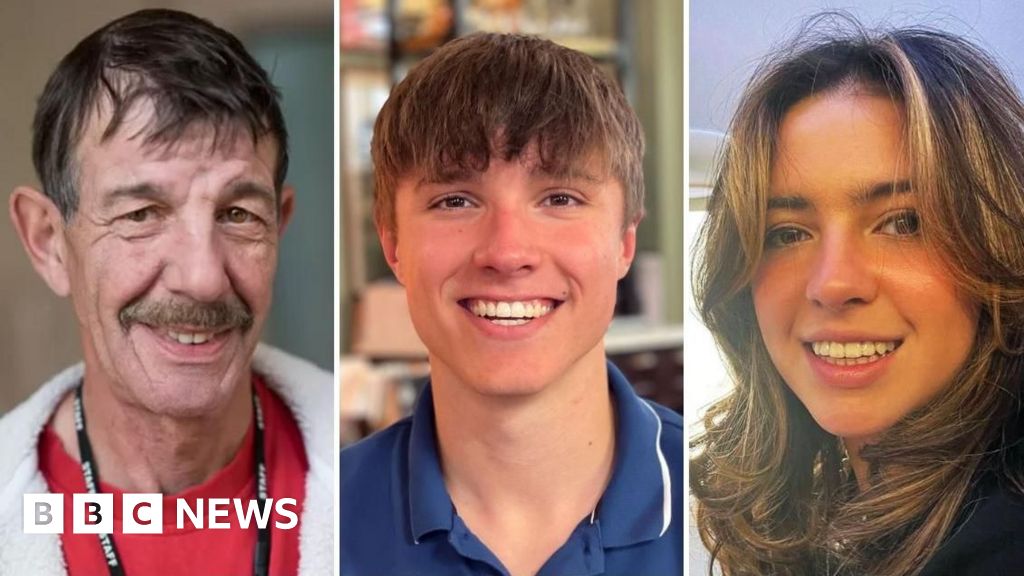ARTICLE AD BOX
 Image source, Alamy
Image source, Alamy
Tents were previously a common sight in underpasses in Milton Keynes
By Becky Morton
Political reporter
Milton Keynes was created in the 1960s as a way of easing housing shortages in London. But five decades later it was facing a housing crisis of its own, dubbed "tent city" in the media because of the encampments of rough sleepers dotted around the centre.
In autumn 2017, there were estimated to be 48 people sleeping rough on a single night in Milton Keynes. That number has now fallen to just 16, according to the local council.
The issue hit the headlines this week, when Home Secretary Suella Braverman's claim that some people were living on the streets as a "lifestyle choice" provoked a backlash from homelessness charities, as well as some Conservatives.
She has proposed restricting the use of tents by rough sleepers, for example by issuing fines to those who refuse to move from shop doorways or charities that supply tents to people identified by police as having caused a nuisance.
Emily Darlington, a Labour councillor in Milton Keynes and the cabinet member for housing, says "tents are just the symptom, they're not the cause".
"There's no point in just dealing with the symptom, it's like you just want to hide away the problem."
She argues people that sleep in tents think they have no other option "because public services or the voluntary sector have failed them".
In Milton Keynes, Ms Darlington says the key to preventing people falling through the cracks has been bringing emergency beds and other support services under one roof.
During the pandemic, councils across England received government funding to help get people off the streets and into emergency accommodation including then-empty hotels, as part of the Everyone In scheme.
Ms Darlington, who is also Labour's parliamentary candidate for Milton Keynes Central at the next general election, says putting people in hotels was only "a sticking plaster" and the council wanted to keep people off the streets for good.
In April 2022 the council opened its own shelter for rough sleepers at the city's old bus station, providing emergency beds for up to 19 people every night.
Crucially, on the ground floor of the building there is also access to GP, mental health and addiction services. Meanwhile, charities provide help setting up bank accounts, accessing benefits and finding housing, as well as hot meals, a hairdresser and laundry facilities.
"So it's not asking people to run around the city, try and make appointments, when they already lead super chaotic lives," Ms Darlington explains.
Image source, Milton Keynes City Council
Image caption,Emily Darlington is the council cabinet member responsible for homelessness in Milton Keynes
At the shelter, those signing in for the night have faced issues including addiction, relationship breakdown and eviction, which contributed to them ending up on the streets.
Joseph, a recovering drug addict, says he became homeless when he was evicted after complaining about the condition of his housing.
Since then the 35-year-old has been sleeping rough on and off for several months.
So what does he make of the home secretary's comment that sleeping on the streets is a "lifestyle choice" for some?
"Wow," he says. "My reaction to that would be try and live one day like that."
Pausing for a moment he reflects that perhaps some people do have other options, but adds: "I had no choice. I had to."
Joseph has used the shelter at the old bus station
As a rough sleeper, he has had to contend with not only the cold but also violence.
"Yesterday a guy came over and stamped on my head. It's constant," he says. "And it's like you don't even sleep. It is rest but you're literally just lying there."
He also developed problems with alcohol "because it's the only thing that keeps you warm outside".
Joseph says the system hasn't been perfect for him and he's struggled to access intensive support for his addictions.
But he still thinks the help offered by the shelter is crucial.
"If this place weren't here, people would die, literally."
The shelter has 19 beds available for rough sleepers
Since the shelter opened, 145 people who have stayed there have been helped to move into long-term accommodation.
Ms Darlington recognises the problem is not solved and there are still some people sleeping rough in Milton Keynes. She says many of these individuals face significant challenges with addiction or mental health issues and continue to be visited daily by outreach workers.
"Some people aren't ready to face their issues, they're not ready to face their addictions... If we force them to participate in things before they're ready, we are just setting them up to fail," she says.
"I don't want to pretend like in Milton Keynes it's all easy and everyone's problems are sorted overnight - they're not. But it's the persistence of working over time with individuals, getting to know them."
Johnny Luk, who is the Conservative parliamentary candidate for Milton Keynes Central, said at a council level there was cross-party support for the work being done to tackle homelessness locally.
However, he said government funding had been "pivotal" in enabling progress, with more than £10m given to the council to tackle homelessness since 2019.
Mr Luk said he would not describe sleeping on the streets as a "lifestyle choice".
"I prefer we positively support homeless people, who are members of our community and deserve empathy and support under complex circumstances, rather than create a new offence or give fines," he added.
Downing Street has said no-one should be criminalised for having nowhere to live and it wants to ensure vulnerable people get support, whilst cracking down on anti-social and intimidating behaviour.
Image source, UnityMK
Image caption,Emma Johnson says her charity is seeing an increase in demand for its services
Emma Johnson is the general manager of local homelessness charity UnityMK, which runs support services on the ground floor below the council shelter, alongside other agencies like the NHS.
She says strong partnerships between voluntary organisations and the council have been key to tackling rough sleeping in Milton Keynes.
However, Ms Johnson is concerned the charity is seeing an increase in demand from rough sleepers, as well as others in temporary accommodation or facing homelessness.
She says this includes some people who are working but end up on the streets due to family breakdown, mental health crises and the high cost of renting.
Official figures suggest a slight increase in rough sleeping in Milton Keynes after the end of the pandemic-era Everyone In scheme, but the council says numbers have now fallen again.
Meanwhile, the number of people living in temporary accommodation in the city is amongst the highest in England, according to research by charity Shelter.
"I think there is just not enough social housing to be able to move people on," Ms Johnson says. "Social housing has to become a priority for whoever's going to be in government."
An independent commission has said the government will not meet its own target to end rough sleeping by 2024, with a severe shortage of affordable housing, a lack of support services and the cost-of-living crisis pushing more people into homelessness.
"I think there will always be people that find themselves homeless," says Ms Johnson. "So it's about trying to create a pathway to pick people up as quickly as possible."

 1 year ago
71
1 year ago
71








 English (US) ·
English (US) ·